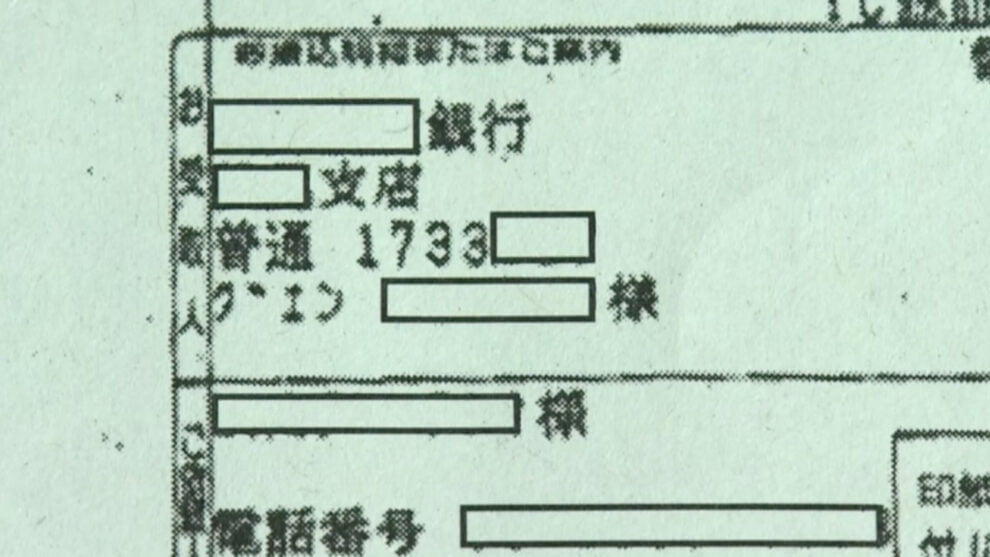Scammers in Japan are raking in millions of dollars by tricking people into transferring funds to bank accounts bought on the black market. Many of the accounts are in non-Japanese names, with the fraudsters exploiting foreigners facing financial hardship.
Suspect bank accounts
So far this year, criminals have stolen about 200 million dollars by tricking people into making transfers at teller machines into illegally attained accounts.
As of the end of September, approximately 1,600 suspect accounts have been identified by police. Of them, 312 accounts, or 20 percent, are held in an apparent foreigner’s name.
A range of nationalities is represented, but the most common name is Nguyen, of Vietnamese origin. Following that is Tran and Jang, Vietnamese and Korean names.
The accounts were opened in financial institutions throughout Japan, from Hokkaido in the north to Kagoshima Prefecture in the south.
How it happens
In Osaka in April, a woman in her 60s received a phone call from a man claiming to be an employee of the city office. She believed his lie: that the health insurance system had changed and she was eligible for a refund.
The woman went to a nearby ATM and followed his instructions to transfer about 700 dollars to a designated account. When she realized she had fallen victim to a scam, the woman contacted police. The bank transfer receipt shows the account she paid into was held in the name Nguyen, printed in Japanese.
A black market for bank accounts
When police investigated the account, they found it was opened in October 2016 by a Vietnamese student who left Japan in January 2018.
Officers suspect it was traded on a black market for bank accounts. It is believed that in some cases, foreign students and technical intern trainees sell the accounts when they return to their home countries.
An uptick in the number of suspect accounts held in foreigners’ names is being attributed to financial pressures.
Desperate times
Japan Vietnam Mutual Support, a Tokyo-based non-profit organization that provides support for Vietnamese students and trainees, is calling on people to stop selling accounts.
The NPO’s president, Yoshimizu Jiho, describes a case where a pregnant Vietnamese woman in her 20s, whose visa had expired, needed help to get home to give birth.
“When I asked her if she could buy a plane ticket, she said she could, and went away saying ‘just wait a minute.’
“When she returned, I asked her where she had been, and she said, ‘I went to Tokyo’s Okubo district to sell my account.'”
According to the NPO, an increasing number of Vietnamese people lost their jobs due to the pandemic and became involved in crime. The group often hears about people selling their account cards and bank books in exchange for cash.
An online social networking group for Vietnamese people in Japan has several posts pertaining to the sale of bank accounts. Police believe that most of the suspect accounts they are investigating have been traded online, selling for hundreds of dollars apiece.
“Many foreigners lost their jobs, money, and homes due to the pandemic,” says Yoshimizu. “I don’t think people are aware that it’s a crime to buy and sell accounts.
“In a situation where they are in poverty, have no money, and cannot make a living, they sell their accounts. This is the current situation in Japan.
“I believe that the government and other organizations need to provide more guidance to prevent people from getting involved in crimes, and police also need to make them aware of the situation.”
A regretful trade
One Vietnamese student, 25, says his acquaintance who was a technical intern trainee sold their account. The student says there are many people who want to buy accounts, insurance cards, and driver’s licenses online. Many foreigners sell them when they leave Japan with no plans to return.
When the trainee returned to Japan for work, he was arrested because the account had been used for fraud.
There are now frequent posts on social networking sites warning of the dangers of selling an account.
“Many international students are financially strapped, and when their part-time jobs were reduced due to the pandemic, they found it difficult to make ends meet,” says the student.
“Also, many come to Japan with debts in Vietnam, but in some cases, they disappear from their workplaces because they cannot even pay the interest,” he explains.
“I think the best thing we can do is help to improve those situations so that they don’t have to buy and sell accounts.”
Check account names
According to police, many of the suspect accounts are used in cases where fraudsters impersonate the city government.
Suzuki Kazuhiro, assistant manager at the Osaka Prefectural Police’s Citizen Safety Division, says: “When you use an ATM, please make sure to check the name and account number of the payee on the screen. By doing so, you can protect your valuable money from fraud.
“Please consult with the police immediately if you notice any suspicious activity.”
Source : NHK










